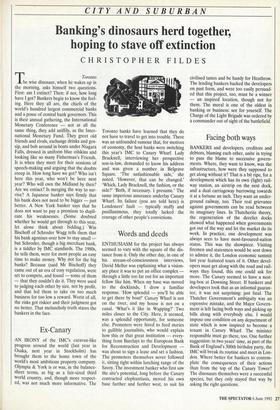CITY AND SUBURBAN
Banking's dinosaurs herd together, hoping to stave off extinction
CHRISTOPHER FILDES
ThToronto e wise dinosaur, when he wakes up in the morning, asks himself two questions. First: am I extinct? Then: if not, how long have I got? Bankers begin to know the feel- ing. Here they all are, the chiefs of the world's hundred largest commercial banks and a posse of central bank governors. This is their annual gathering, the International Monetary Conference — not at all the same thing, they add sniffily, as the Inter- national Monetary Fund. They greet old friends and rivals, exchange drinks and gos- sip, and bob around in boats under Niagara Falls, dressed in uniform blue oilskins and looking like so many Fisherman's Friends. It is when they meet for their sessions of speech-making and arguing that the doubts creep in. How long have we got? Who isn't here this year, who won't be here next year? Who will own the Midland by then? Are we extinct? Is merging the way to sur- vive? A Japanese banker says firmly that his bank does not need to be bigger — just better. A New York banker says that he does not want to pay a premium to dupli- cate his weaknesses. (Some doubted whether he would get through to this year, let alone think about bidding.) Win Bischoff of Schroder Wagg tells them that his bank agonises over how to stay small but Schroder, though a big merchant bank, is a tiddler by IMC standards. The 1980s, he tells them, were for most people an easy time to make money. Why not for the big banks? Because (said Mr Bischoff) they came out of an era of cosy regulation, were set to compete, and found — some of them — that they couldn't do it. They were used to judging each other by size, not by profit, and that led them to take on too much business for too low a reward. Worst of all, the risks got riskier and their judgment got no better. That melancholy truth stares the bankers in the face.


































































 Previous page
Previous page